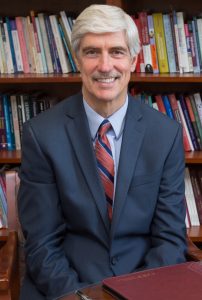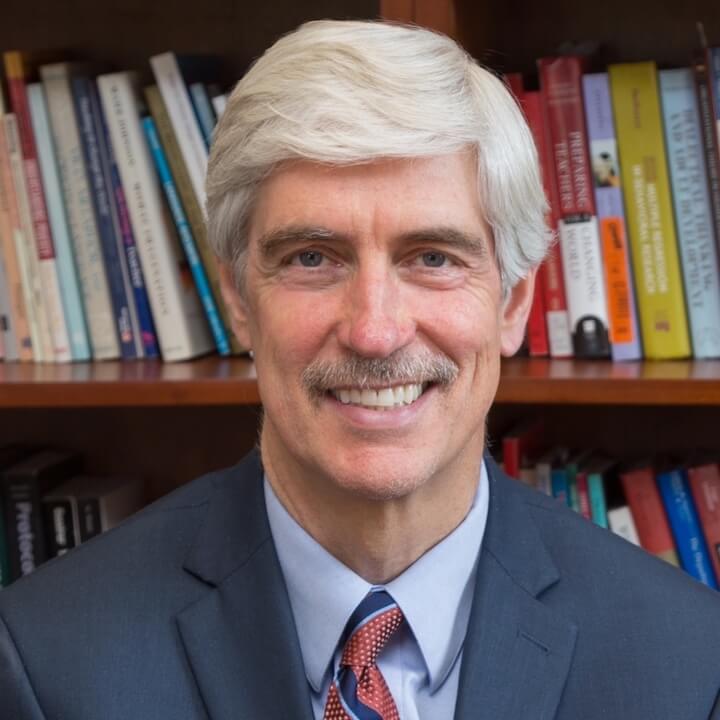John Henning wants to change the way teachers are trained. The Dean of the School of Education at Monmouth University, Henning is the architect of a new type of teacher residency program designed to produce better teachers.
New and different routes to teaching credentials are, in fact, not new. New Jersey pioneered some of the first alternatives more than 30 years ago, but since that time, teacher residencies with a strong mentorship and internship component have been designed to avoid much of the criticism of earlier alternatives. They are, however, almost the exclusive purview of graduate schools.

Henning has a different idea. The program that he has created at Monmouth begins placing prospective teachers into schools as early as possible as undergraduates. And he wants his education majors to embrace substitute teaching.
A classroom teacher for more than two decades before he transitioned to higher education, Henning felt that many of the traditional methods of training teachers were flawed. “It’s based on an idea that we should sit in classrooms in college, and that’s how we best gain knowledge. Our challenge in doing all this is to get to the right model of the way people really learn to teach, but do it within the system that we have. I mean, the whole system. The fee structure, the university system, how we have classes, and how we think about credits; all of that.”
Henning said that he believes the essence of teacher training lies in the link between theory and practice. “The thing that motivates me the most is if we get [the teacher candidates] out in schools more, they’ll be better prepared.”
Deep Immersion for Undergrads
Monmouth University’s School of Education is in the first year of implementing a pilot program emphasizing deep immersion for prospective teachers in both its undergraduate and graduate programs. About 35 students are participating. Henning believes that these students will end up being better educators and, in turn, will make Monmouth’s program stronger and even more appealing to both prospective teachers and prospective employers.
The teacher residency model, Henning admits, takes a lot of energy to be effective. “And yet,” he said, “I’ve found through my experience in the last few years, the longer they’re there, the more valuable they become to the school. It’s just like any job. We just get better on our job the more we know about it and the longer we’re there.”
Henning explained that modern teacher education is usually based on a co-teaching model in a clinical internship — a portion of an experience that continues to be called ‘student teaching’ — where the lead teacher never leaves the classroom. He believes that this model is better for students, but he also felt there was something important in the old method that left a student teacher alone to get a feel for classroom management.
“Then I thought, ‘with substitute teaching, we can get that back. And they get paid for it.’ Of course,” he said, wryly, “if we send them off to substitute teach, they’d better succeed, or that’s on us.”
Emphasis on Substitute Teaching
While it is not unusual for teacher candidates to substitute for their mentor teachers, many programs deliberately limit the amount these candidates can substitute. Henning took the opposite approach: he made substitute teaching a central component of the Monmouth University teacher residency program.
“The vision for this,” Henning explained, “is that we can start them in their freshman year, working in the YMCA, for example, working with kids, tutoring after school and they get paid. And then we expand it more, they begin to substitute, and if they’ve worked in schools for several years by the time they graduate, there’s going be a lot of seasoning.”
Also, Henning said that the reason he talks so much about substitute teaching is that it is already a major part of school system budgets and there is a real need for qualified substitutes.
While some states require a bachelor’s degree to become a substitute teacher, New Jersey requires only 60 undergraduate credit hours. That has afforded Henning an opportunity that he has been pushing to take full advantage of.
Henning hopes that what is being piloted at Monmouth will become “a complete revolution in teacher preparation to where everyone across the country is being paid in a residency as they’re developing.
“I like to say, ‘What if you had a first-year doctor who told you that you need your gall bladder removed? And then that doctor tells you that they worked through medical school flipping burgers, but read a lot of textbooks on how take your gall bladder out. How would you would feel?’”
Henning said he’s been mindful of multiple budgetary restraints in developing the pilot program including partner school system budgets, the university’s own budget, and, perhaps most important of all, the budgets of the teacher candidates, many of whom may depend on working during their education to make ends meet.
He has been working with school systems to help him build a stipend for Monmouth teacher residents into their budgets for the upcoming school year. According to Henning, the university would enter into an agreement with the teacher candidate to use available scholarship dollars and any other available financial aid as they commit to a predetermined number of days of substitute teaching and clinical residence.
Henning would like to systematize the program and make the teacher residency idea more of an expectation on the part of the teacher candidate, the university, and the partner school districts. He believes that the program will deepen the partnerships between the university and schools and ultimately give those districts better first-year teachers who can increase student performance.
Stellar Results from Pilot Program Implementation
One Monmouth University student participant in the pilot program is Erin Murray, who decided to change careers and enter the university’s Master of Arts in Teaching program. She believes that participating in the program has already made her a better teacher.
“Without a doubt, it has made a difference,” she said. “I could not imagine walking into student teaching now without doing everything I’ve done with the residency program. It has helped so much. My confidence, my classroom management, all of it.”
Murray explained that in her residency, she was always at Middle Road Elementary School in Hazlet, N.J., on set days of the week to cover classrooms in case of an emergency or to assist teachers as a paraprofessional. The rest of the week, she was free to substitute in any school in the Hazlet Township school district that needed her.
Christine Grabowski, who teaches a third and fourth grade class at Middle Road Elementary and is the professional development liaison between the school, the district and Monmouth University, believes the residency program has deepened the bond between the school and the teacher candidates.
“Our staff comes to know them and if they need a substitute teacher, they want them, because they know that they’re trained. They’re a skilled person, they get to know our kids, and, if they’re not substituting, they’re working in classrooms, so they’re coming in, maybe they’re a paraprofessional for the day or maybe working with small groups of students, just helping out. They get a diverse, rich learning experience for themselves and we see them as a part of our community.”
Grabowski says that she has no doubt that the program will make the candidates better teachers. “The year-long student teaching is wonderful,” she said, “but this just really moves it up a notch, and it gives them even more.”
“It ended up being an amazing experience,” said Murray. “I got so much experience in different classrooms, different grades, general education, special education. The kids know me as a teacher; that’s such a help. I’ve been ‘Miss Murray’ since day one!”
For Tara Micciulla, the director of elementary and secondary education for Eatontown (N.J.) Public Schools, the experience of implementing the pilot residency program in her district also has been “amazing.”
“[The teacher candidates] are getting a hands-on opportunity, so for them it’s amazing because they’re getting into the school system and they’re getting paid to do this. And then for us, it’s just the opportunity to have teachers who are learning to be teachers and interested in the profession coming in and helping us out at a very minimal cost. That’s what’s wonderful for us.”
Micciulla’s experience has been mirrored in other school districts. It’s something that William O. George, III described multiple times as a “win-win.”
George, the superintendent of schools for the Middletown Township (N.J.) School District, credits these multiple wins to the way Henning has devised the program.
“From a school district standpoint,” George explained, “we get a supplement of a resource and someone to work with our students beyond the contractual day, during different times of the day, particularly when they’re doing their volunteer hours. That is a great learning opportunity for our students.”
He points to one teacher candidate who has completed a variety of tasks in her last two years of undergraduate teacher education. “She is far beyond a beginning teacher, and she doesn’t graduate until May,” George said, enthusiastically. “All 12 elementary principals in my district already know her name. They already know that she’s been working with [master teachers] for two years.”
George said that his district has been working on these immersion techniques with the university for some time and he reports that all of the teacher candidates that have gone through the program in his district have been hired.
“It’s just because Monmouth University is ahead of every other college and university in teacher education.”
Better Teachers
Henning thinks that all colleges and universities are graduating better teachers than they did 20 or 30 years ago but he also believes that the advent of the undergraduate teacher residency program is the most exciting change in teacher training he’s seen in his career.
“Think about what it would mean for us nationally,” he said, “if we were cultivating young teachers through one or two or three or even four year, pre-professional programs where they’re in schools, they’re in residencies, and they know how to make the quick decisions while they’re getting a higher education. They’re getting a college degree that introduces them to higher ideas to think about, and they have the practice component, too. I think that’s good for everyone involved. It’s good for the children; it’s good for the candidates.
“I want our teacher candidates to know that if they come into our program we’re going try to help find the ways to get them into schools. If you come here and you’re interested in spending more time in a school, we will get you out there.”
Henning, members of the Monmouth University School of Education faculty, partner school district administrators, and teacher candidates will present their innovations in teacher preparation at two national conferences in March: the American Association of Colleges for Teacher Education conference in Baltimore and the National Association for Professional Development Schools conference in Jacksonville, Fla.
For more information on the Monmouth University teacher residency program, contact Dean John Henning at 732-571-4484 or jhenning@monmouth.edu.

